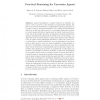Free Online Productivity Tools
i2Speak
i2Symbol
i2OCR
iTex2Img
iWeb2Print
iWeb2Shot
i2Type
iPdf2Split
iPdf2Merge
i2Bopomofo
i2Arabic
i2Style
i2Image
i2PDF
iLatex2Rtf
Sci2ools
117
click to vote
JELIA
2004
Springer
2004
Springer
Practical Reasoning for Uncertain Agents
Logical formalisation of agent behaviour is desirable, not only in order to provide a clear semantics of agent-based systems, but also to provide the foundation for sophisticated reasoning techniques to be used on, and by, the agents themselves. The possible worlds semantics offered by modal logic has proved to be a successful framework in which to model mental attitudes of agents such as beliefs, desires and intentions. The most popular choices for modeling the informational attitudes involves annotating the agent with an S5-like logic for knowledge, or a KD45-like logic for belief. However, using these logics in their standard form, an agent cannot distinguish situations in which the evidence for a certain fact is ‘equally distributed’ over its alternatives, from situations in which there is only one, almost negligible, counterexample to the ‘fact’. Probabilistic modal logics are a way to address this, but they easily end up being both computationally and conceptually comple...
Related Content
| Added | 02 Jul 2010 |
| Updated | 02 Jul 2010 |
| Type | Conference |
| Year | 2004 |
| Where | JELIA |
| Authors | Nivea de Carvalho Ferreira, Michael Fisher, Wiebe van der Hoek |
Comments (0)

